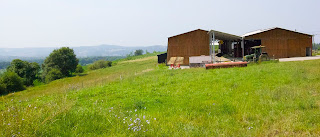 |
On their farm "Lait p'tits béarnais" Fanny and her husband Jean-Baptiste are making cheese. From their own milk which comes from their own cows. And of course, for healths sake, it's a raw milk cheese. That's as simple and expectable as can be. But behind this unagitated describtion lies the most creamy and best-in-taste cheese anyone can imagine. And the story of a passionate couple, finding a way to make a living. |
At first sight you can see the deep belief, when you look at Fanny and Jean-Baptiste managing their farm. They welcome visitors good-humored, wide awaked und full of cordiality. But the start wasn't as easy as it might look today. But all beginings are difficult.
 |
| Fanny ( in the center) and visitors in the barn |
Fanny take over the farm from her parents. In accordance with local custom, an intensive and conventional corn-farm. But quite soon, the problems of this form of harvesting came up: The dependancy on international seed conglomerates combined with deep enviromental burdens. Monocropping demands intensive use of agricultural pesticides and chemical fertilizers to bring up somesort of economic feasability. A vicious circle in which farmers allover the world are trapped.
Soon Fanny and Jean-Baptiste made up their minds: This could not be the future. Not for the farm, not economically and of course not for them. But a new perspective came up. Jean-Baptiste was born in Savoy. A landscape where small dairy farms are quite common. Thats what they both want to build up in the Béarn: A dairy farm, with farm made cheese and free farmyard selling. But the realisation of this plan was quite difficult. Administrative barriers is the keyword.
 |
| Picturesque: The current farmstead |
 |
| Good appetite and comfort: Norman cow in the stall |
Milk is a living primary product. Even minor environmental influences can convert the milk. But Fanny and Jean-Baptistes target is to produce a preferably natural cheese. For this reason they resign fermenting fodder like silage corn, which could influence the milk microbiological and in flavour. In addition the cows are free to roam and even in the stall have enough space to walk around. Animal welfare, as already mentioned, is the main point in keeping the cows healthy. And to guarantee salutary dairy products.Without pasteurization or homogenising the milk will continue processing. The only way to keep out any unwanted additives. In the end, you find a handmade, authentic and first-class product. In polar opposite to the way they work at "Lait p'tits béarnais", most dairy farm modify the raw milk in thermical and technical ways. This denaturation makes dairy products more and more incompatible for the human body. In case, this has nothing to do with lactose intolerance which is a genetic endowment. Fanny mentions:" When you want to keep up all the taste, assets and vitamins of the milk - please, don't boil it!" This is their way to bring up to the peoples mind, that raw milk is something dangerous.
The product range includes Tommes ( a Medium hard cheese) at different ages, some sort of Reblochon ( a very creamy, softer cheese) which in case of it's richness in taste, stands alone. In addition their are some cream cheese, some blended with Piment d'Espelette, a chili which is grown nearby. Really a tasting-sensation! But the really astonishing finish in the product range is the 'Confiture de Lait', somesort of long cooked, caramelized milk. In addition with curd cheese, a simple, but amazing dessert!



No comments:
Post a Comment